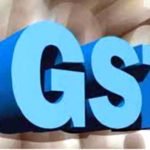New Delhi, Dec 21 (UNI) The GST Council headed by Finance Minister Ms Nirmala Sitharaman on Saturday met and took a slew of decisions aimed at simplifying the Goods and Services Tax (GST) framework and addressing key sectoral concerns.
The Council decided to extend Integrated Goods and Services Tax (IGST) exemption on surface-to-air missiles but deferred much-anticipated exemption of tax on insurance premium both health and life.
This decision to extend IGST exemption on surface-to-missile will ease the financial burden on defence imports and support the government’s ongoing efforts to strengthen the nation’s defence capabilities.
On the issue of rationalisation of GST on health and life insurance premium, the Minister said the GoM headed by Bihar Deputy Chief Minister Samrat Chaudhary informed the Council that a lot of work has been done on the subject but some more time is required and also views of the Insurance regulator are also awaited.
In view of this any decision was deferred and the GoM will be given extension to submit final report at its next meeting.
The proposal to include Aviation Turbine Fuel (ATF) under the ambit of GST met with resistance from several states during the meeting held today, Ms Sitharaman said adding that no Group of Ministers would be appointed and that no changes would be made to the current taxation of ATF.
Thus, ATF would be treated as in case of petrol and diesel. This is in view of several states expressing concerns over the potential revenue loss, as VAT on ATF is a significant source of income for them.
The Council at its 55th meeting held in Jaisalmer, Rajasthan approved increase in rate on sale of old and used cars including EV to 18 percent from 12 percent while clarifying that ACC blocks containing more than 50 percent fly ash will attract 12 per cent GST.
Black pepper whether fresh green black pepper or dried black pepper and raisins when supplied by an agriculturist is not liable to GST, the Council decided and in another major decision it said “No GST is payable on penal charges levied/collected by banks and NBFCs for non-compliance with loan terms.
In another decision, the GST Council approved a reduction in the tax rate on fortified rice kernels to 5 percent. To provide a boost to the export sector, the Council decided to reduce the compensation cess on supplies to merchant exporters. This move aims to increase working capital for exporters and make them more competitive in the international market.
In a decision that would support digital transactions, the Council approved an exemption for payment aggregators “alone” handling transactions below Rs 2,000. However, this exemption does not apply to payment gateways or fintech services, which remain subject to GST, the Minister said after the meeting.
In another decision to clarify the classification of few items like popcorn, Sitharaman clarified that popcorn with added sugar, such as caramelized popcorn, falls under a separate tax bracket due to the added sugar content, which attracts a different rate compared to plain or salted popcorn and thus is subject to 18 per cent tax bracket.
She also announced the decision to exempt GST on Gene therapy and to extend the concessional 5 percent GST rate on food inputs of food preparations under HSN 19 or 21 that are supplied for food preparations intended for free distribution to economically weaker sections under a government program subject to the existing conditions.
Jammu and Kashmir CM Omar Abdullah, who attended the meeting, said there had been a lot of speculation that GST on shawls particularly Pashmina shawls will be hiked, so we had come prepared to ensure that wouldn’t happen. Thankfully, it wasn’t taken up and we will also ensure that in the future also, something like this is not considered because it would be life-threatening to our Pashmina shawl industry.
It said that transactions in vouchers shall be treated neither as a supply of goods nor as a supply of services. Distribution of vouchers on principal-to-principal basis shall not be subject to GST. However, where vouchers are distributed on principal-to-agent basis, the commission/fee or any other amount charged by the agent for such distribution is taxable under GST.
Additional services such as advertisement, co-branding, marketing and promotion, customization and technology support, customer support etc. related to vouchers would be leviable to GST on the amount paid for these services.
Unredeemed vouchers (breakage) would not be considered as supply under GST and no GST is payable on income booked in the accounts in respect of breakage, an official statement said.
The issue of whether charges collected by municipalities for granting FSI including additional FSI, chargeable to GST on reverse charge basis was brought up in the Council. The matter was deferred for further examination on the behest of the Central Government on the ground that this amount relates to Municipalities or local authority.











